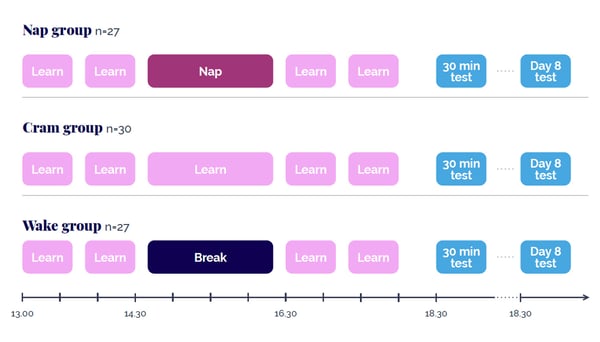Is it at all possible that having a short nap in the middle of doing a lot of intense studying can help improve memory? And if so, could napping during the day be a better alternative to cramming studying for as long as possible?
We’ve had a look at some research to see the impact of napping between revision sessions, and whether napping is the key ingredient that every student needs to succeed.
What does the research say?
An interesting study involved teaching undergraduate students a random topic in four study sessions. Then they were all given a one-hour gap in the middle of their study sessions. During this time students either:
- Stayed awake during the break
- Took a nap
- Did an extra cramming session
All students were given a test on the same day and then given another one a week later.

The results found that students who took a one-hour nap in-between learning sessions performed the best on both the same-day exam and the one they did a week later. Those who took a nap also felt more alert going into their study sessions later in the afternoon.
Students who crammed performed better on the test the same day than those who stayed awake, but there was no meaningful difference between the results one week later. So, cramming only had a temporary benefit thanks to recency.
The role of napping in revision
We can see from the research that naps between study sessions trump staying awake or cramming. However, this doesn’t necessarily suggest that napping is essential for revision – rather that it is better than the other two options for enhancing students’ recall.
Another thing to consider is that naps should arguably range between 15 and 30 minutes – any longer and students could enter deep sleep. When a deeper sleep is interrupted, they can experience “sleep inertia” (i.e., waking up feeling groggy), which impairs their memory and cognitive abilities throughout the day.
Sleep inertia also makes students want to go back to bed. If they do, they won’t have as much revision time and will find it harder to sleep at night. Luckily, the participants in the study had researchers to wake them up!
How to make the most of the benefits of sleep
Even though this study shows that naps can be helpful for memory, it’s important to consider why students feel the urge to nap in the first place – most of the time, it’s because they’re not getting enough sleep.
Because sleep aids and enhances memory, it’s a powerful revision technique. So, here are ways that can help students reap the benefits of sleep without relying on naps…
- Keep up a consistent schedule of good quality sleep
Research has shown that consistently having a good quality of sleep with of an appropriate duration is strongly associated with better grades.
Students can ensure that they improve their sleep quality by putting away their screens between 30 and 90 minutes before bed and limiting caffeinated drinks in the evening. Teenagers should aim for at least 9 hours of sleep (more for younger ones, slightly less for older students who probably need at least 8 hours of sleep per night). It’s only when students do this consistently that they will really see improvements in their memory and productivity.
- Combine sleep with Spacing
Spacing is one of the most effective study techniques, as it involves revisiting material little and often so that it’s easier to remember in the long term. And when students combine Spacing with a full night’s sleep, this can make even more of an improvement to their memory.
One study found that students who studied in the evening, slept, and then re-visited learning material the next day had better long-term memory of the content than those who didn’t sleep between study sessions.
Also, students in the study who used Spacing and sleep spent 50% less time studying, so splitting up revision sessions with a good night’s sleep is a productive use of students’ time.
- Avoid all-nighters
The short-term benefit of cramming is simply not worth the stress and students will find it better to prioritise their 8 hours of sleep instead of staying up to study. Although students may think cramming works, it is an ineffective strategy as there is not enough time for information to be secured in their long-term memory.
When students have a full night’s sleep instead of cramming, they can enter each stage of sleep meaning that their brains can solidify important information into their long-term memory. Then, they won’t have to rely on constant napping during the day.
- Do light exercise
When students get moving, they can reap similar benefits as taking a nap. Research has found that exercising after studying can improve the ability to retain and recall information across students of all ages, as well as provide them with an energy boost.
So, partaking in exercise could be a better alternative to napping, especially when it is later in the day or if napping is a less viable option.
Final thoughts
Napping has its pros and cons. It’s great for memory enhancement in students but it can be easy to make napping mistakes, such as napping too late in the day or napping for too long. Instead, students should prioritise a productive routine that incorporates good quality sleep, effective studying strategies and exercise.
For more tips on how students can use sleep to their advantage, have a look at our guide on Sleep and Learning.







